Texas reverends file suit to stop Ten Commandments displays in classrooms
Published in News & Features
FORT WORTH, Texas — After Texas lawmakers recently approved legislation requiring public schools to post the Ten Commandments in their classrooms starting on Sept. 1, a group of reverends has filed a federal lawsuit in the Northern District of Texas in an effort to stop it.
A lawsuit was filed Tuesday, June 24, against Texas Commissioner of Education Mike Morath and three district school boards located within the Northern District of Texas that argues the required posting of the Ten Commandments in classrooms is unconstitutional.
The eight plaintiffs, who are local reverends and parents, allege in the suit that the law undermines the “rights of parents to direct their children’s religious education and upbringing” and violates the Establishment Clause and Free Exercise Clause of the First Amendment. The Establishment Clause prohibits the government from making laws “respecting an establishment of religion,” while the Free Exercise Clause protects one’s right to practice their religion without government interference.
“Permanently posting the Ten Commandments in every Texas public-school classroom unconstitutionally pressures students into religious observance, reverence, and adoption of the state’s mandated religious scripture,” the suit argues.
“Many Texans, including those who are not religious or who adhere to different faith traditions, do not subscribe to the specific text or tenets of the Ten Commandments as presented in S.B. 10. For instance, followers of Hinduism, Buddhism, and Taoism generally do not consider the commandments to be part of their belief system, and some Christians, such as Jehovah’s Witnesses, do not view them as authoritative.”
Gov. Greg Abbott signed Senate Bill 10 into law on June 20. Starting in the 2025-26 school year, the law requires all public school classrooms to have a poster or framed copy of the Ten Commandments that is at least 16 inches wide by 20 inches tall. The text must be written in “a size and typeface that is legible to a person with average vision from anywhere in the classroom.”
Alongside Morath, the suit names the schools boards of the Dallas Independent School District, the Desoto Independent School District and the Lancaster Independent School District as defendants. Some of the plaintiffs’ children attend the school districts, according to the suit. The group of parent-reverends — who are Christians and members of the Nation of Islam — are requesting the court to strike down the law as unconstitutional and prevent it from going into effect.
“Lancaster ISD is aware of the lawsuit and is currently monitoring the information. At this time, we do not have any further comment,” officials said in a statement on Wednesday.
Dallas ISD officials declined to comment on pending litigation.
DeSoto ISD officials said in a statement the district operates in accordance with district and state policies, in addition to state and federal laws, while remaining “committed to fostering an inclusive, respectful, and supportive learning environment for all students and families, regardless of religious background or personal beliefs.”
“At this time, the district is closely monitoring the legal proceedings and guidance surrounding S.B. 10. As with all emerging legislation, DeSoto ISD will work in consultation with its legal counsel and governing agencies to ensure that any required actions are implemented responsibly, with the best interest of students and families at the center,” district officials said.
“DeSoto ISD recognizes the diverse cultural and religious identities represented in its school community and will continue to prioritize the safety, dignity, and educational wellbeing of every student. The district respects the role of parents and guardians in guiding their children’s personal and religious development and will strive to remain sensitive to the varying perspectives within its schools,” district officials added.
The Texas Education Agency did not immediately respond to a request for comment by the Star-Telegram.
What are the Ten Commandments?
Different versions of the Ten Commandments, which are considered to be ethical guidelines observed by Judeo-Christian faiths, exist based on denominations and biblical translations. The suit argues that the Texas’ state-required version “mostly aligns with a Protestant rendition.”
As outlined by lawmakers in Senate Bill 10, this is the exact wording of how the Ten Commandments should be displayed in classrooms in the upcoming school year:
“I AM the LORD thy God.
Thou shalt have no other gods before me.
Thou shalt not make to thyself any graven images.
Thou shalt not take the Name of the Lord thy God in vain.
Remember the Sabbath day, to keep it holy.
Honor thy father and thy mother, that thy days may be long upon the land which the Lord thy God giveth thee.
Thou shalt not kill.
Thou shalt not commit adultery.
Thou shalt not steal.
Thou shalt not bear false witness against thy neighbor.
Thou shalt not covet thy neighbor’s house.
Thou shalt not covet thy neighbor’s wife, nor his manservant, nor his maidservant, nor his cattle, nor anything that is thy neighbor’s.”
_____
©2025 Fort Worth Star-Telegram. Visit star-telegram.com. Distributed by Tribune Content Agency, LLC.







Comments